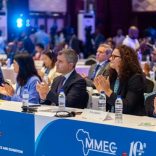Mozambique: Manica authorities admit inability to lessen river pollution
Imperative to meet challenges of small scale mining – Mozambique government

PanAfGeo (File photo)
It has become imperative to improve the quality of life of artisanal miners and seek strategic responses to the social challenges posed by such small scale mining, Mozambique’s Deputy Minister of Mineral Resources and Energy, Augusto Fernando, declared on Monday.
Speaking at the opening in Maputo of a “Southern African Regional Seminar on Training in the Areas of the Environment, Community, Health and Safety in the Mining Sector”, Fernando said that artisanal mining “normally operates on the margins of the formal economy and of the legal framework”.
Accidents had occurred frequently in artisanal mines, and this type of mining “is characterised by low productivity and defective measures of health, safety and environmental impact”. It was thus necessary, he said, to seek ways of making this type of mining sustainable, particularly in terms of the safety of the miners, and minimising the environmental damage it causes.
The choice of training as the theme of the seminar, Fernando said, “seeks to rise to the challenge of building the capacity of the public sector and other stakeholders involved in the extractive industry, and particularly small scale mining which is at the basis of the livelihood of many households”.
“Our vision”, he continued, “is that the development of strategic management of artisanal and small scale mining, in which responsibilities are defined for all stakeholders, is crucial for formalising this sub-sector and making it sustainable”.
The seminar, Fernando urged, “should provide us with the skills to explore options on how to impose compliance with environmental norms through good practices in order to make mining safe and sustainable”.
He said that in 2016 mining production in Mozambique grew by about 15 per cent in comparison with 2015, with a growth in mineral exports of around 33 per cent. The main components of this growth were the titanium bearing heavy mineral sands at Moma, in the northern province of Nampula, the coal of Moatize in Tete province, and natural gas in the southern province of Inhambane.
To improve mining performance, “the existence of human resources that can rise to the challenges is indispensable”, added Fernando, “and so we shall continue the investments we have been making in training”. This would allow the creation of “a critical mass of human resources, to meet the demands of the extractive industry”.
The three day seminar is organised by the African, Caribbean and Pacific Group (ACP) and the European Union. The Minerals Development Programme of the ACP-EU is investing 13.1 million euros (14 million US dollars) in training programmes aimed at improving environmental and health and safety practices.













Leave a Reply
Be the First to Comment!
You must be logged in to post a comment.
You must be logged in to post a comment.